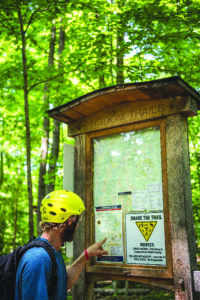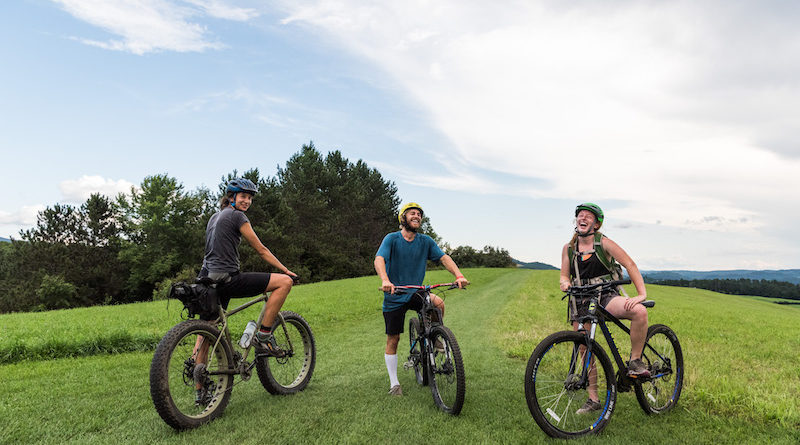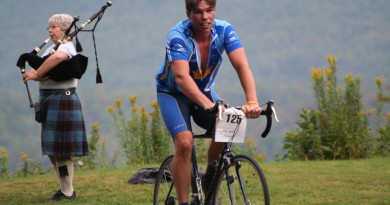Solidarity is the Path
We’re all in this together. It’s an overworked phrase to be sure, but the recent dramatic changes in our daily lives caused by the coronavirus have driven home how true this can be, especially when it comes to trail access.
Beginning in March as our state tried to navigate the best course to protect our citizens, the Vermont Mountain Bike Association (VMBA) and the majority of the local mountain bike chapters followed the Governor’s Executive Order (as well as Vermont Forest Parks and Recreation’s guidelines) regarding trail use. As a result, the vast majority of our trail networks were temporarily closed, more often at the request of the town or state government. The goal then was to help stop the spread of Covid-19 and save lives while cooperating with land managers.
What we saw in the weeks that followed was a backlash caused by the trail closures. Some riders, I believe completely missed the “big picture.” There have been plenty of reports of riders ignoring the current trail closure listings posted on Trailhub, VMBA, and local chapters’ websites, and disregarding signs at trailheads.
In some areas, riders actually tore down trail closures signs, and in so doing, threatened continued trail access to those networks for everyone. One would think the recent closure of a significant portion of the network at Kingdom Trails would serve as a wake-up call for us all.
I sit on the Trails Committee for Fellowship of the Wheel in Chittenden County but I have no doubt many of the same problems exist in most, if not all, the trail networks in the state.

So what happens as we reopen? What happens when trails or behavior around trails is restricted in other ways or for other reasons?
If riders can’t follow trail rules during this crisis, a pandemic with a proven outcome—sickness and death—how can we expect them to follow rules as we open up, rules on social distancing, respecting landowners’ requests and yes, trail closures for any other reason?
Organizations like VMBA, Fellowship, WATA, Mad River Riders, etc., are trail access organizations. The main reason for their existence is to protect and promote trail access so when those chapters have to make a decision to close trails temporarily for any reason, it’s because it is in the best interest of ensuring we have continued access to trails. And it is often done so at the request of the land managers.
There is no other agenda.
Some riders seem bent on being antagonistic towards the very organizations that keep the trails they are riding regularly open. These riders don’t seem to understand that without these strong organizations and years of legwork and discussions with the community, the high quality of mountain bike trails that Vermont has become famous for would not exist.
Here in Chittenden County, we have a total of six trail networks available to riders. With one exception, all of those networks are on public land and their respective town governments manage those properties. Many miles of trails across the state are also on public property. But those that are on private land require each trail chapter to liaise with the decision-makers/owners who manage those properties. This past season, here in Chittenden County we came close to losing access to one of those trail networks due to a single citizen’s complaint about too much noise at the trailhead.
That’s how tenuous trail access can be.
Virtually no available public properties remain in the county that could replace any losses so if a single network gets closed for whatever reason it will simply mean decreased riding options for all.
Please honor trail closures—it’s not hard to do. I’ve seen many riding their mountain bikes on dirt roads, private networks or in areas where there’s no potential impact to trail access. Thank you to those who have made this small sacrifice in support of a better riding future.
If you’re not sure what’s open, find someone to ask, look up the trail organization, or check Trailhub.
Sadly, much of the riding public does not support VMBA or their local trail chapters either financially or with donated time and that’s a shame.
For the price of a decent meal and a couple beers you can be a positive force in supporting the sport you enjoy. Seems a small price to pay and over 90 percent of your dues go right back into your local chapter while connecting you with every trail chapter in the state and the more than 1,000 miles of trails they manage.
When a rider doesn’t engage with their local trail chapter, they’re disconnected from what’s happening in those networks and is simply out of the loop when it comes to things that might affect the future of their riding. If you’re not supporting your local trail access organization but you’re riding on the networks that they manage you’re a bit of a freeloader and the choices you make as an individual rider affect us all. If you’re riding on land that isn’t your personal property you’re there by permission, not as a right, as some seem to think.
We need to follow trail rules all the time, whether it’s about not riding during Covid 19 (when lives, literally, are at stake), or, as trails reopen, observing the social distancing, respectful riding and other rules trail groups may put in place.
You may disagree with a trail closure but when it comes to trail access, we’re all in this together.
Bill Flack started riding mountain bikes in 1985 and he recently completed a bucket-list-goal to ride in each of the lower 48 states.


